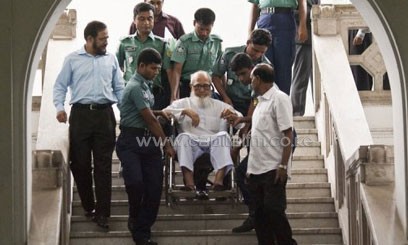
Ghulam Azam (C) emerges from the Bangladesh International Crimes Tribunal in Dhaka, on May 13, 2012/AFP
Activists of the Jamaat-e-Islami party threw homemade bombs at police, after taking to the streets in cities in support of the Islamist, who could face the death penalty if convicted, officials said.
Journalists were among up to a dozen people injured, after they were caught in the clashes in Dhalpur district of the capital Dhaka, local police chief Rafiqul Islam said.
“One of the journalists was hit by (shrapnel),” he told AFP, adding the protesters hurled at least five small home-made bombs at police.
Police also fired rubber bullets at protesters in the cities of Bogra, Comilla and Rajshahi after activists went on the rampage, attacking and torching dozens of vehicles, police officials told AFP.
A war crimes tribunal in Dhaka is set to hand down its verdict against Ghulam Azam, 90, for alleged crimes committed during the independence war against Pakistan, which the government says killed three million people.
Prosecutors have sought the death penalty for Azam, comparing him to Nazi leader Adolf Hitler. They describe him as a “lighthouse” who guided all war criminals and the “architect” of the militias which committed many of the 1971 atrocities.
When India intervened at the end of the nine-month war and it became clear Pakistan was losing, the militias killed dozens of professors, playwrights, filmmakers, doctors and journalists.
Azam was described as the “mastermind” of the massacres of the intellectuals. Many of their bodies were found a few days after the war at a marsh outside the capital, blindfolded and with their hands tied behind their backs.
Security was tight at the International Crimes Tribunal – set up by the country’s secular government in 2010 – ahead of the verdict, set to be handed down on Monday.
Previous verdicts by the tribunal have sparked widespread and deadly violence on the streets of a country that has a 90 percent Muslim population.









































